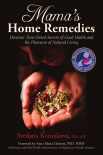Mama's Home Remedies: Discover Time-Tested Secrets of Good Health and the Pleasures of Natural Livin, Svetlana Konnikova [classic fiction .TXT] 📗

- Author: Svetlana Konnikova
Book online «Mama's Home Remedies: Discover Time-Tested Secrets of Good Health and the Pleasures of Natural Livin, Svetlana Konnikova [classic fiction .TXT] 📗». Author Svetlana Konnikova
is invisible to the eye.
—Antoine de Saint-Exupery (1900– 1944), French pilot and poet ƒ
It is not so much our friends’ help that helps us
as the confident knowledge that they will help us.
—Epicurus (341– 270 B.C.), Greek philosopher
ƒ
Stop Sneezes and Sniffles and Stifle a Cold @ 83
“Why, one can hear and see the grass growing!” thought Levin, noticing a wet, slate- colored leaf moving beside a blade of young grass.
—Leo Tolstoy (1828– 1910), Russian novelist, from Anna Karenina, 1877
ƒ
Even if something is left undone, everyone must take time to sit and watch the leaves turn.
—Elizabeth Lawrence (b.1934), American writer
ƒ
Cheerfulness is the best promoter of health,
and is as friendly to the mind as to the body.
—Joseph Addison (1672– 1719), English writer and statesman ƒ
In all things of nature there is something of the marvelous.
—Aristotle (384– 322 B.C.), Greek philosopher
ƒ
[Nature] is the one place where miracles not only happen, but happen all the time.
—Thomas Wolfe (1900– 1938), American novelist
ƒ
Can you live without a willow tree? Well, no, you can’t. The willow tree is you.
—John Steinbeck (1902– 1968), American writer
ƒ
Everything in nature acts in conformity with law.
—Immanuel Kant (1724–1804), German philosopher
84 ^ Mama’s Home Remedies
Chapter 5
A Sickness of the 21st Century
These people have learned not from books, but in the fields, in the wood, on the riverbank. Their teachers have been the birds themselves, when they sang to them, the sun when it left a glow of crimson behind it at setting, the very trees, and wild herbs.”
—Anton Chekhov (1860–1904), Russian playwright and story writer FACTS
Acccording to the latest information available from the American Lung Association, the Centers for Disease Control and Prevention (CDC), and the National Institute of Allergy and Infectious Diseases (NIAID), In the United States:
^ Allergies affect more than 50 million people.
^ Pollen allergy (hay fever or allergic rhinitis) affects nearly 10 percent of the people (26 million people), not including asthma.
^ Allergies are the sixth leading cause of chronic disease, costing the health-care system $18 billion annually.
^ Chronic sinusitis, most often caused by allergies and the most commonly reported disease, affects approximately 38 million people.
A Sickness of the 21st Century @ 85
^ Allergic drug reactions, commonly caused by antibiotics such as penicillin and cephalosporin, occur in 5 to 10 percent of all adverse drug reactions.
^ Eight percent of children six years old or younger experience food allergies. An estimated one to two percent of adults have food allergies.
^ A severe allergic reaction known as anaphylaxis occurs in 3.3
percent of the population as a result of insect stings. At least 40 deaths each year result from sting anaphylaxis.15
Allergies impact the way millions of people live in America. Here are some more interesting statistics regarding allergies in the United States: a) Peanut or tree nut allergies affect approximately three million Americans and cause the most severe food-induced allergic reactions.16
b) Nine million visits to office-based physicians in 2000 were attributed to allergic rhinitis.17
c) Seasonal allergic rhinitis, often referred to as “hay fever,” affects more than 35 million people in the U.S.18
We are prone to developing allergies when we are under stress or oversensitive. Researchers tell us repeatedly that certain smells, herbs, berries, oranges, and chemicals can provoke allergic reactions and disturb our normal sleep pattern.
Today allergies taunt us and disrupt our daily lives. Many people take allergy medications on a regular basis and, in fact, cannot live a normal life without them.
Austrian doctor Clemens von Piquet coined the term allergy in 1906. The first symptoms described by him stated that our body’s ability to identify and destroy any harmful organisms such as viruses or bacteria is essential to our survival. People are like most species living on the earth: We have developed our individual immune systems. These systems also target what are considered to be harmless, not dangerous, particles such as flower pollen, dust mite, dust in our homes, or peanuts, causing swelling, inflammation, itching, and, in extreme situations, death.
86 ^ Mama’s Home Remedies
Today approximately 90 percent of the world population has reactions to various irritants. Why does this happen in 90 percent of people and not in the other 10 percent of the world’s population? It happens because 90 percent of people don’t realize that their bodies accumulate toxins every day from air they breathe and from the food they eat.
What should we do? The answer is simple. All of us without any exceptions must consistently clean our bodies from these harmful substances poisoning our blood. Like you clean your house at least one time per week, you should clean your body every day using different natural “cleaners.” Start your day with a cup of hot water and a piece of lemon before breakfast to “rinse”
your blood vessels. Take burdock, 425 mg a day. Make hot peppermint or horsetail tea and add a piece of lemon. Eat baby carrots or drink





Comments (0)